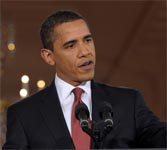Europe turns up heat on Obama ahead of G20
 Brussels - Europe knows what the world's financial markets need, and now it is up to Barack Obama to deliver: That is the message from European Union leaders ahead of the Group of 20 (G20) summit, which opens Thursday.
Brussels - Europe knows what the world's financial markets need, and now it is up to Barack Obama to deliver: That is the message from European Union leaders ahead of the Group of 20 (G20) summit, which opens Thursday.
"It will be the task of those who go to Pittsburgh to convince our American friends that we have to get the international finance community to accept new rules of behaviour," Luxembourg Premier Jean- Claude Juncker told German radio station Deutschlandfunk.
Sweden, current holder of the EU's rotating presidency, called a summit Thursday in Brussels to debate a joint European strategy on issues such as financial regulation, exit strategies from their emergency spending sprees and caps on bank managers' bonuses.
EU leaders made it abundantly clear that, as far as they are concerned, it is time for the US president to follow Europe's lead.
"The financial crisis started in the US. It is also the concern of taxpayers and people of the US to solve this problem," said Swedish Prime Minister Fredrik Reinfeldt, who will represent the EU at the two-day summit in Pittsburgh, Pennsylvania.
Jose Manuel Barroso, newly re-elected head of the EU executive, the European Commission, was just as blunt.
"We will point to our strong record (on financial regulation) and insist that others follow. ... We will insist on coordinated action," he said.
It is not often that the EU tries to push the US around, and still less often that it succeeds.
But with the EU home to seven of the G20 members, the bloc's joint statement took an unusually hard line as it pushed for reforms in spite of expected US resistance.
"Exit strategies need to be designed now and implemented in a coordinated manner as soon as recovery takes hold," it said.
That is likely to raise eyebrows in Washington, where any call for an immediate exit plan would be seen as far too early.
The statement was equally outspoken on the question of climate change, calling for an expanded system for trading permits to emit greenhouse-gases "in order to significantly increase financial flows to developing countries."
That is an explosive demand at a time when the US Senate is bogged down in a long, drawn-out debate over tackling climate change.
The bloc's statement was particularly strident on the question of managers' bonuses.
Regulators should not only find ways to limit the amount top managers receive as bonuses, they should be allowed to scrap payments entirely "in the event of a negative development," it said.
That seems calculated to send shock-waves through Wall Street, where the independence of financial institutions is a pillar of the system.
Some leaders even suggested that if the US did not follow their lead on crucial issues, it would simply be left behind.
"If we don't manage to bring the Americans in line in Pittsburgh, ... we in Europe should do things the way we think they ought to be done, whether or not the Americans are with us," Juncker said.
But EU leaders appeared sanguine that Obama would back them, saying that world voters would stand for nothing else.
"I'm confident that in Pittsburgh there is a common will to achieve action on something that has angered the populations of almost every country," British Prime Minister Gordon Brown said.
Whether they will appear quite so self-assured when they step out in Pittsburgh to meet Obama and his counterparts from China, India and other powers remains to be seen. (dpa)